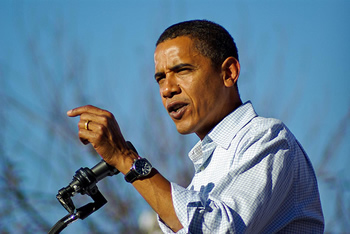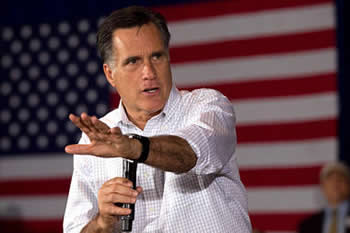"An Inevitable and Tragic Conflict"
The Christian Gospel and America's Presidential Election
For Sunday August 19, 2012
Lectionary Readings (Revised Common Lectionary, Year B)
1 Kings 2:10–12; 3:3–14 or Proverbs 9:1–6
Psalm 111 or Psalm 34:9–14
Ephesians 5:15–20
John 6:51–58
"Then David rested with his fathers and was buried in the City of David. . . So Solomon sat on the throne of his father David, and his rule was firmly established" (1 Kings 2).
The American presidential election is just three months away. It's a good time to contrast our political illusions with the Biblical reality. While one essay can't nail down all the answers on such a complex issue, it can open up some important questions.
The story of Solomon and its larger context in the six books of 1–2 Samuel, 1–2 Kings, and 1–2 Chronicle reveal an obvious point — that lots of the Bible is profoundly political. This week's text describes the transition of power from David to Solomon. Further on we read about Israel's role in the geo-politics of Assyria, Edom, Egypt, Moab and Tyre. There are wars, alliances made by marriage, famines, conspiracies, assassinations, economic trade agreements, taxes, and foreign policy negotiations. We read about Solomon's massive building projects, the temple at Jerusalem and his royal palace, both of which were built by slave labor conscripted from resident aliens, and of his incomparable wealth.
 |
Obama. |
Some of this material makes for boring reading with its use of government archives, bureaucratic invoices, and court records. This political narrative runs for 250 pages in my Bible and covers 400 years, from Israel's first king David until its exile by Babylon in 586 BC. But if so much scripture is purely political, it isn't merely political. Embedded in this story is a theological critique of Israel's political history.
Some people counsel the safety of silence when it comes to politics, but you could never make that case from the Bible. God's revelation of himself shows that he cares deeply about and somehow interacts with human politics, governments, and statecraft. In the New Testament we encounter Jesus's announcement of an alternate reign or kingdom that is redolent with inherently political consequences. Jesus renounced violence and blessed peacemakers, he favored poor people and warned the rich, he embraced ethnic outsiders and infuriated smug insiders, he told us to love our enemies rather than to kill them, he partied with moral failures and flaunted religious conventions.
Mary's birth announcement included an ominous prophecy directed at the authorities and powers: "He has brought down rulers from their thrones, but has lifted up the humble" (Luke 1:52). And when Jesus was dragged to the Roman governor's palace, he faced three political allegations: "We found this fellow subverting the nation, opposing payment of taxes to Caesar, and saying that He himself is Christ, a King." (23:2).
How should Christians think about the civil war in Syria, the consequences of wars in Iraq and Afghanistan (human, financial, political), the belligerence of North Korea's missile tests, Hezbollah's insistence that it would destroy Israel if it could, or that most people in Africa live in dreadful poverty? The story of Solomon reminds us of what the French sociologist Jacques Ellul said in his book "The Politics of God and the Politics of Man": "The Bible shows us that the church is not just a spiritual matter, that politics is not just simply a human action of no concern to us. It may be that politics is the kingdom of the devil, but this certainly concerns us as Christians."
Other Christians make the opposite mistake. Instead of avoidance and silence they reduce the meaning of faith to partisan politics. Liberal Christians identify with Democrats and conservative believers with Republicans. A closer look at the Solomon story shows why both alliances are equally mistaken.
We do read about Solomon's wisdom, and his earnest prayer when he dedicated the temple. But sincerity doesn't mean wisdom; his story ends with personal corruption to pagan gods and goddesses (Ashtoreth, Molech, Chemosh) whose practices included child sacrifice, exorbitant taxes, and a royal harem of 1,000 concubines. His son Rehoboam bragged about how oppressive his subsequent government would be: “My father made your yoke heavy, but I will make it still heavier; my father chastised you with whips, but I will chastise you with scorpions” (1 Kings 12:14). Rehoboam provoked a civil war that ripped the country apart and that only ended with defeat by the global powers Assyria (in 722 BC) and then Babylon (in 586 BC).
The story of Solomon is tragic regarding political power. The larger Biblical context is even more so.
The tragedy begins with the origins of Israel's centralized political power in 1 Samuel 8. The people wanted a king “like the other nations.” Samuel objected, went to God in prayer, and was rebuffed by the people’s insistence. In longing for a king, Israel was not rejecting Samuel but God himself. Samuel ceded to their request but warned them of the harsh consequences — the government would conscript their children for wars and make them domestic slaves, confiscate their land, and impose exorbitant taxes. Israel’s first king, Saul, did all this and more.
The political panorama of 1–2 Kings includes the reigns of forty kings and one queen (Athaliah in 2 Kings 11) in the 400 hundred years from the death of David to Israel's exile to Babylon in 586 BC. Only two kings received unqualified approval by the narrator (Hezekiah in 2 Kings 18:3 and Josiah in 22:2). With monotonous regularity, over thirty times the narrator renders the ominous judgment that a king "did evil in the eyes of the Lord." Instead of the glorification of political power or nationalistic celebration, this 400-year history of politics is unremittingly negative — in keeping with the dire warning in 1 Samuel 8.
This narrative thus conveys a radical relativization, subversion and even judgment of Israel's politics, a remarkable feat when you consider that these are Israel's sacred writings and that such negative conclusions about royal power must have put the author at some risk.
And so the psalmist warns us: "Do not put your trust in princes, in mortal men, who cannot save. When their spirit departs, they return to the ground; on that very day their plans come to nothing" (146:3–4). There's a tragic irony in the futility of politics that nevertheless solicits our absolute allegiance. The only place in the entire Bible where God laughs is at this inverse relationship between the pomposity of politics and its ultimate impotence: "The kings of the earth take their stand and the rulers gather together… The one enthroned in heaven laughs; the Lord scoffs at them" (Psalm 2:4).
Jesus said that the kingdom he inaugurated is "not of this world" (John 18:36). Greg Boyd (see below) notes that most human kingdoms and powers go to any lengths to exercise power "over" others (political, economic, military, cultural), whereas the reign of God that Jesus taught and modeled flourishes — counter-intuitively and paradoxically — by what he calls "power under" others, a radically counter-cultural mandate for an alternative ordering of human affairs.
This is exactly what Paul teaches in this week's epistle: "submit to one another out of reverence for Christ" (Ephesians 5:21).
 |
Romney. |
But submitting to one another is exactly what nations, governments, and political power cannot and must not do. Thus Reinhold Niebuhr (1892–1971), America's most important theologian of the last century, famously insisted that we're stuck between the lust for power and the call of virtue.
This moral ambiguity characterizes individuals and especially nations. Niebuhr believed that while individuals can be moral, nations and societies are inevitably immoral. This meant that there was for Niebuhr what John Patrick Diggins calls "an inevitable and tragic conflict" between the one and the many. Thus the title of Niebuhr's book, Moral Man and Immoral Society (1932).
Jesus didn't allow himself to be co-opted by any political party of his day, and didn't engage in any political action. From his birth when King Herod tried to murder him until his death at the hands of Pilate, Jesus threatened the political powers, not because he sought to control what they controlled but because "he undercut its pretensions and claims to supremacy" (Garry Wills). If Jesus is Lord, then caesar is not Lord. Thus, concludes Garry Wills, Jesus didn't acquiesce in silence before political power, he confronted it, so that "the program of Jesus's reign can be seen as a systematic antipolitics" (What Jesus Meant).
Thus the "inevitable and tragic conflict": to reject both the safety of silence and the pressures of partisanship.
In April of 2004, pastor Greg Boyd preached a controversial series of six sermons called "The Cross and the Sword" at his 5,000 member Woodland Hills Church in Saint Paul, Minnesota. As he explains in his book that grew out of these sermons, The Myth of a Christian Nation; How the Quest for Political Power is Destroying the Church (2006), in the months preceding the 2004 elections, Boyd wanted to warn his congregation about "nationalistic and political ideology," of reducing the gospel to any political point of view, of sincere but badly mistaken convictions like the belief that America is a Christian nation, or that believers should "take back the nation for God."
No, Boyd preached, "the path through politics is not the road to God."
Many parishioners thanked Boyd for his boldness, but others were not so enamored. About a thousand people left the congregation.
It would have been easier for Boyd to have remained silent or been partisan. The relationship between religion and politics is complex, controversial, divisive, ambiguous, and often full of compromise. Thus we're told never to mix politics and religion. But that's precisely what the Old Testament story about King Solomon does. Boyd didn't preach that believers should avoid politics, or that Christian convictions have no political implications. As the story about Solomon demonstrates, there is a prophetic critique of political power that avoids both the safety of silence and partisan ideology.
For further reflection:
* Contrast the relative claim upon us to "render to Caesar what is Caesar's" with the absolute and unconditional claim to "render to God what is God's" (Matthew 22:21).
* How do the politics of both the left and the right try to co-opt faith?
* In what sense did Jesus advocate a "systematic antipolitics" (Wills)?
* What do you make of Israel's sacred narrative that speaks so negatively about 39 of 41 of its leaders?
Image credits: (1) Zerohedge.com and (2) The Christian Science Monitor.





